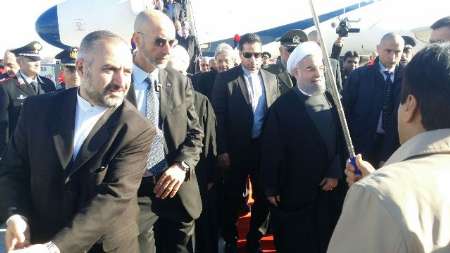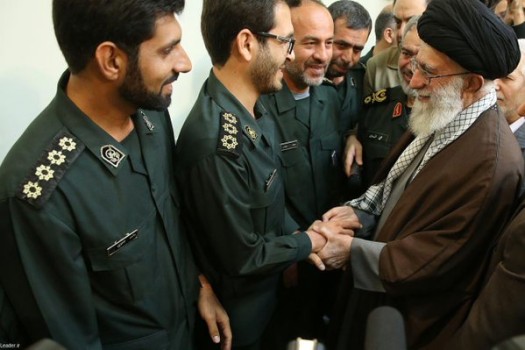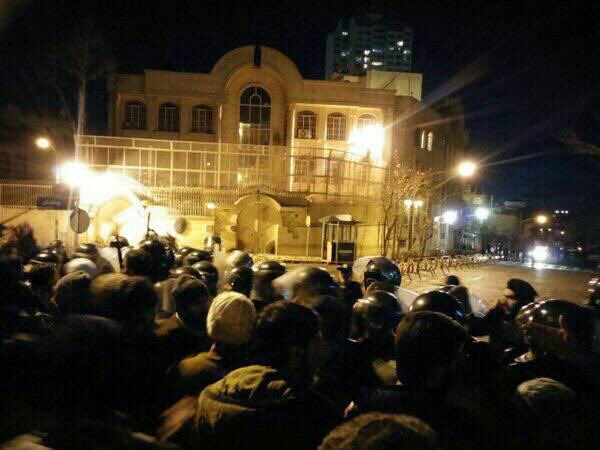PHOTO: A crowd watches the burning Saudi Embassy in Tehran, January 2, 2016
LATEST
- Searching for Business, Rouhani Begins Trip to Italy and France
- Supreme Leader’s Office: God Helped Us Detain US Navy Sailors
Iran’s judiciary has renewed the political offensive against Saudi Arabia, accusing “the enemy” of staging the attack by a crowd on the Saudi Embassy in Tehran.
Saudi Arabia sparked a diplomatic crisis on January 2 when it executed 47 detainees, including a prominent Shia cleric. Hours later, the gathering in Tehran — probably supported by elements within the Iranian regime — burned and ransacked part of the Saudi Embassy. The following day, Riyadh cut diplomatic relations with the Islamic Republic.
President Rouhani tried to ease the tension by denouncing “extremists” and saying they would be punished, as he called for an enquiry. More than 50 people were arrested, and two officials in Tehran were dismissed.
However, Iran’s judiciary, clerics, and MPs maintained that the attack was instigated by foreign actors, naming the US and Israel as well as Saudi Arabia among the suspects.
Judiciary spokesman Gholam Hossein Mohseni-Ejei declared on Sunday, “There are implications and evidence that the enemy has used some simple-minded elements in [bringing about] the violation against the Saudi embassy.”
Mohseni-Ejei said some of the 200 demonstrators did not have criminal intent. But “some are suspected to have entered the embassy with the intent to cause fire and destruction or have had the enemy infiltrated among them, [a likelihood] that is under investigation”, he asserted.
The spokesman claimed that a suspect has been arrested outside the country and that several people had entered the building on his orders: “Investigations are underway to see whether he and his agents are to blame for all the destruction or not.”
It was unclear if Ejei was referring to the arrest of cleric Hassan Kurdmihan, the director of religious institutions in Tehran and Karaj. An MP said Kurdmihan, linked to the hardline group Ansar Hezbollah, had been in Syria and was detained upon his return to Iran.
While trying to pin blame on groups outside Iran for the incident, Mohseni Ejei maintained that the Islamic Republic had maintained diplomatic standards in its investigation:
The attack has been condemned by all the authorities in the establishment, and the establishment was quick to act on the incident. Other countries have witnessed attacks against foreign embassies too, but no country has followed up on the incident as seriously.
He said Riyadh’s breaking of relations was an overreaction and asked Iranian authorities to respond “proportionately”.
Searching for Business, Rouhani Begins Trip to Italy and France
President Rouhani has arrived in Rome in the first leg of his trip to Europe pursuing investment and trade.
Accompanied by a large Iranian business delegation, Rouhani is visiting Italy and France and will also meet Pope Francis.

Iranian officials said last weekend that Rouhani will agree the purchase of 114 European Airbus passenger planes, in a deal worth $50 billion, to boost Iran’s crippled aviation industry. He may also confirm an agreement with carmakers Peugeot Citroen and Renault.
Rouhani may also sign deals valued at about 17 billion Euros ($18.4 billion) of contracts with Italy, according to an Italian official who asked not to be identified because the information isn’t public.
Supreme Leader’s Office: God Helped Us Detain US Navy Sailors
The Supreme Leader’s office has continued the gloating over the Revolutionary Guards’ brief detention of 10 US Navy personnel on January 12:
God’s deed; IRGC’s timely job; Americans with hands on heads pic.twitter.com/b4XkdOdWoF
— Khamenei.ir (@khamenei_ir) January 24, 2016
The personnel and their two boats were released the next day after US Secretary of State John Kerry and Iranian Foreign Minister Mohammad Javad Zarif, fearing that the incident would block the long-awaited implementation of the July 2015 nuclear deal, held emergency discussions. However, the Guards have continued to hail the event as a demonstration of Iran’s strength and the weakness of the American enemy.
On Sunday, Ayatollah Khamenei met the Guards troops who detained the American sailors:


